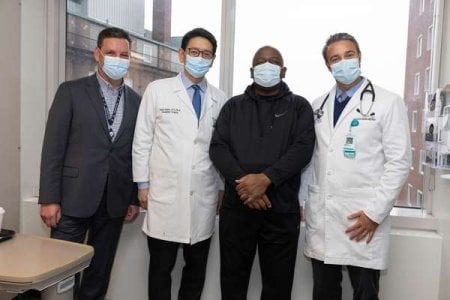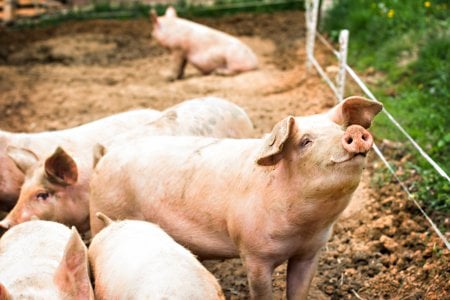Can pigs become a ‘beacon of hope’ in organ transplants and save lives?
By
Seia Ibanez
- Replies 15
In a world where the demand for organ transplants far exceeds the supply, medical science has been tirelessly searching for solutions to save lives.
Remarkably, pigs are emerging as a ‘beacon of hope’ in this quest, with their potential to alleviate the critical shortage of human organs for transplantation.
This is not a tale from a science fiction novel; it's the reality of modern medicine, where the boundaries of possibility are constantly being pushed.
In March, surgeons in the United States performed a transplant that saw a kidney from a genetically modified pig successfully implanted into a human.
The recipient, 62-year-old Richard 'Rick' Slayman, unfortunately passed away nearly two months after the procedure.

However, the Massachusetts General Hospital surgical team has stated that there is no indication his death was a result of the transplant.
Despite the loss, the field of xenotransplantation—the transplant of animal organs into humans—remains optimistic about the future.
The pressing need for non-human alternatives to human organ donation is stark.
In Australia alone, as of May 1, around 1,400 individuals were on the waiting list for a kidney transplant, the most sought-after organ, while in the United States, over 96,500 patients are in need.
Professor Wayne Hawthorne, a leading figure in transplantation and the immediate past president of the International Xenotransplantation Association, has highlighted the scarcity of 'brain-dead donors,' whose organs are vital for transplants.
‘We have been trying for decades to develop and improve on organ donation from human to human,’ he said.
‘Once your heart stops, you stop breathing, and your circulation stops and your organs are no good.’
‘That's the problem, you have to have this circulation. So it means we have very, very few organ donors...we're talking only a few 100 donors per year in Australia, compared to many thousands of patients.’
For decades, the medical community has explored the possibility of using animal organs and tissues in humans.
In one case in 1984, ‘Baby Fae’ became the first infant to undergo a xenotransplant procedure with the heart of a baboon. The 14-day-old baby survived for 21 days.
Pigs, in particular, have become the focus due to their similar organ sizes and the fact that pig parts are already widely used in human medicine, such as in diabetes insulin and heart valve tissue.
Moreover, ethical concerns and the difficulty in breeding non-human primates make pigs a more viable option.
‘People don't like these sorts of animals being used in research, let alone as donors to humans, Hawthorne said.
‘The other big problem is trying to breed them... like humans, they take a very long time to generate and have single offspring, usually.’
‘So they're very, very difficult to generate as organ donors.’
The key to successful pig-to-human organ transplants lies in gene editing.
This cutting-edge technology allows scientists to modify pig organs to be more compatible with the human body, reducing the risk of rejection by the recipient's immune system.
The case of Slayman, who received a modified pig kidney after his human transplant failed, is a testament to the progress made in this field.
Before his transplant, kidneys from similarly edited pigs had been successfully transplanted into monkeys, with one surviving for more than two years.
Dr Tatsuo Kawai, a member of the transplant team, described the pig kidney as 'truly the most beautiful kidney' he had ever seen.
‘The success of this transplant is the culmination of efforts by thousands of scientists and physicians over several decades,’ Dr Kawai said.
‘Our hope is that this transplant approach will offer a lifeline to millions of patients worldwide who are suffering from kidney failure.’
Australia is at the forefront of islet cell transplantation and is working closely with international researchers to advance xenotransplantation.
However, challenges such as importing the necessary pigs for trials and developing local porcine colonies for xenotransplantation remain. These endeavours require significant financial support and adherence to strict ethical guidelines.
‘We have spent decades developing our own transgenic pigs for clinical transplants here in Australia and require more support to take these to the clinic,’ Professor Hawthorne said.
They have also worked closely with the World Health Organization to ensure strict guidance and ethics.
‘The reason we haven't done these transplants earlier is not just because we didn't have the transgenic pig,’ he said.
‘We didn't want to make any mistakes...we wanted to get the ethics and all of our background research right to the point where we can provide safe and efficacious xenotransplants.’

What are your thoughts on this story, members? Let us know in the comments below.
Remarkably, pigs are emerging as a ‘beacon of hope’ in this quest, with their potential to alleviate the critical shortage of human organs for transplantation.
This is not a tale from a science fiction novel; it's the reality of modern medicine, where the boundaries of possibility are constantly being pushed.
In March, surgeons in the United States performed a transplant that saw a kidney from a genetically modified pig successfully implanted into a human.
The recipient, 62-year-old Richard 'Rick' Slayman, unfortunately passed away nearly two months after the procedure.

Rick Slayman (second from the right) with his care team after his kidney transplant. Credit: Massachusetts General Hospital
However, the Massachusetts General Hospital surgical team has stated that there is no indication his death was a result of the transplant.
Despite the loss, the field of xenotransplantation—the transplant of animal organs into humans—remains optimistic about the future.
The pressing need for non-human alternatives to human organ donation is stark.
In Australia alone, as of May 1, around 1,400 individuals were on the waiting list for a kidney transplant, the most sought-after organ, while in the United States, over 96,500 patients are in need.
Professor Wayne Hawthorne, a leading figure in transplantation and the immediate past president of the International Xenotransplantation Association, has highlighted the scarcity of 'brain-dead donors,' whose organs are vital for transplants.
‘We have been trying for decades to develop and improve on organ donation from human to human,’ he said.
‘Once your heart stops, you stop breathing, and your circulation stops and your organs are no good.’
‘That's the problem, you have to have this circulation. So it means we have very, very few organ donors...we're talking only a few 100 donors per year in Australia, compared to many thousands of patients.’
For decades, the medical community has explored the possibility of using animal organs and tissues in humans.
In one case in 1984, ‘Baby Fae’ became the first infant to undergo a xenotransplant procedure with the heart of a baboon. The 14-day-old baby survived for 21 days.
Pigs, in particular, have become the focus due to their similar organ sizes and the fact that pig parts are already widely used in human medicine, such as in diabetes insulin and heart valve tissue.
Moreover, ethical concerns and the difficulty in breeding non-human primates make pigs a more viable option.
‘People don't like these sorts of animals being used in research, let alone as donors to humans, Hawthorne said.
‘The other big problem is trying to breed them... like humans, they take a very long time to generate and have single offspring, usually.’
‘So they're very, very difficult to generate as organ donors.’
The key to successful pig-to-human organ transplants lies in gene editing.
This cutting-edge technology allows scientists to modify pig organs to be more compatible with the human body, reducing the risk of rejection by the recipient's immune system.
The case of Slayman, who received a modified pig kidney after his human transplant failed, is a testament to the progress made in this field.
Before his transplant, kidneys from similarly edited pigs had been successfully transplanted into monkeys, with one surviving for more than two years.
Dr Tatsuo Kawai, a member of the transplant team, described the pig kidney as 'truly the most beautiful kidney' he had ever seen.
‘The success of this transplant is the culmination of efforts by thousands of scientists and physicians over several decades,’ Dr Kawai said.
‘Our hope is that this transplant approach will offer a lifeline to millions of patients worldwide who are suffering from kidney failure.’
Australia is at the forefront of islet cell transplantation and is working closely with international researchers to advance xenotransplantation.
However, challenges such as importing the necessary pigs for trials and developing local porcine colonies for xenotransplantation remain. These endeavours require significant financial support and adherence to strict ethical guidelines.
‘We have spent decades developing our own transgenic pigs for clinical transplants here in Australia and require more support to take these to the clinic,’ Professor Hawthorne said.
They have also worked closely with the World Health Organization to ensure strict guidance and ethics.
‘The reason we haven't done these transplants earlier is not just because we didn't have the transgenic pig,’ he said.
‘We didn't want to make any mistakes...we wanted to get the ethics and all of our background research right to the point where we can provide safe and efficacious xenotransplants.’
Key Takeaways
- Researchers are exploring xenotransplantation, the transplantation of animal organs into humans, to tackle organ shortages, with pigs as the primary focus due to organ size similarities and ease of breeding compared to non-human primates.
- Advances in gene editing are offering hope for successful pig-to-human organ transplants, with efforts to match pig organs to human immune systems better.
- Australia is a leader in islet cell transplantation and is contributing to xenotransplantation research despite challenges such as importing pigs for trials and the need for significant funding to develop local pig colonies.
- Although there have been recent setbacks, such as the death of a patient after receiving a genetically modified pig kidney, the xenotransplantation community remains optimistic about the potential of this field to offer lifesaving options for patients with organ failure.
Last edited:








